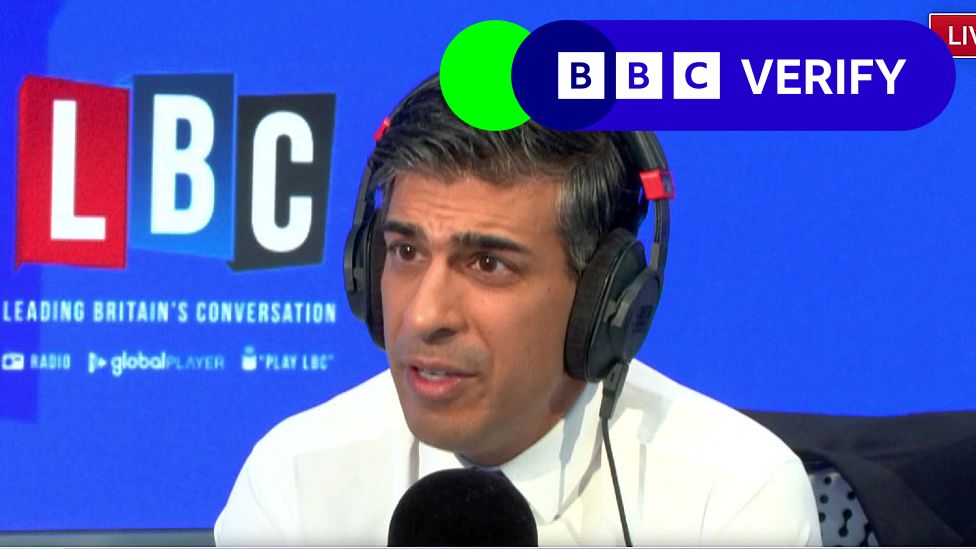Fact-checking PM's claims on prisons, crime and the NHS

- Published
Prime Minister Rishi Sunak appeared on a radio phone-in on LBC on Wednesday.
BBC Verify has examined claims the PM made about immigration, crime, defence spending and NHS waiting lists.
Small boats
During a discussion on immigration, Mr Sunak said: "Last year - the first year that I was in power - for the first time ever across the entire year, we've reduced the number of boats by over a third."
That is true - the overall numbers in 2023 were a third lower than the year before according to Home Office figures, external:
In 2023, 29,437 people arrived in small boats
In 2022, 45,755 people arrived in small boats
Mr Sunak has made "stopping the boats" one of his five government priorities.
However, they are still coming.
In the first three months of 2024, 5,435 people crossed the English Channel - a new record for arrivals between January and March.
Since then another 82 people made the crossing, bringing the total this year to 5,517.
Waiting lists
On reducing NHS waiting lists in England - another of his five priorities - Mr Sunak conceded that he had: "not made as much progress as I would have liked" and confirmed that "the waiting list is higher today then when I took office”.
But he also said: "The waiting lists have now fallen for four months in a row."
The overall number of waits for non-emergency treatment actually fell five months in a row, from September 2023 to January 2024, dropping by about 170,000 in that period, to a total of 7.58 million.
But that figure is still up 360,000 from the same month last year and indeed up 620,000 from when Mr Sunak came to office.
The government has made progress on people facing the longest waits, with considerably fewer waits of more than 78 weeks than when he became PM.
Crime levels
"Overall crime is down by about 50% since 2010 and by about a fifth since the start of this Parliament," Mr Sunak told LBC.
The Crime Survey for England and Wales (CSEW) , externalis the preferred source for long-term estimates of crime. The survey reported 9.7 million offences in the year to March 2011 and 4.3 million in the year to September 2023 - that is a fall of more than 50%.
But those figures exclude fraud and computer misuse, which only started being included in the CSEW in 2017.
That makes this comparison difficult.
Fraud and computer misuse is a significant category - in September 2023 there were almost as many incidents of fraud and computer misuse as incidents of all other crimes put together.
The second part of the claim - that crime has fallen by a fifth since the Parliament started at the end of 2019 - is about right.
Overall crime has fallen by 17%. Excluding fraud it has fallen by 23%.
Nato spending
Mr Sunak said: "Behind the US, we are and have consistently over the past decade been, the second largest spender on defence in Nato."
The military alliance releases figures, external comparing how much each of its members spends on defence.
It is measured as a proportion of the size of an economy, using GDP.
All Nato members have pledged to spend at least 2% of GDP on defence per year by 2024.
On that measure, for the last 10 years the UK has been the third or fourth highest spender each year, except in 2023, which is the latest year for which the figures have been published.
In that year, Poland was the top spender, allocating 3.9% of GDP, followed by the US at 3.2%. The UK was in eighth place with 2.3%.
- Published15 February
- Published22 April
Prison places
Another way of measuring Nato spending is to convert each country's defence spending into US dollars.
On that measure, the UK has indeed been in the number two slot for the last 10 years.
The prime minister said that the government is “embarking right now on the largest expansion of prison places that we've seen in …decades and decades.”
The government did announce the “biggest prison building programme in more than 100 years” in its Prisons Strategy , externalback in 2021.
It said an extra 20,000 prison places would be delivered in England and Wales by the mid-2020s. This would be made up of 18,000 prison places previously announced in 2020 plus 2,000 temporary places.
As of March 2024, 5,856 places have been delivered, external which is less than a third of the target.
The government claims it is “on track” to deliver a total of 10,000 places by the end of 2025, including a third new prison.
Nearly 600 places delivered so far are Rapid Deployment Cells, a temporary type of accommodation which has a 15-year lifespan.
There are nearly 87,000 people in prison, external and many prisons are overcrowded. The total population is projected to increase up to 114,800 by March 2028.
Additional reporting by Rob England
Correction 12 April: The Nato spending section was originally based on figures it published estimating that the UK spent 2.1% of GDP on defence. It has updated these to 2.3%.